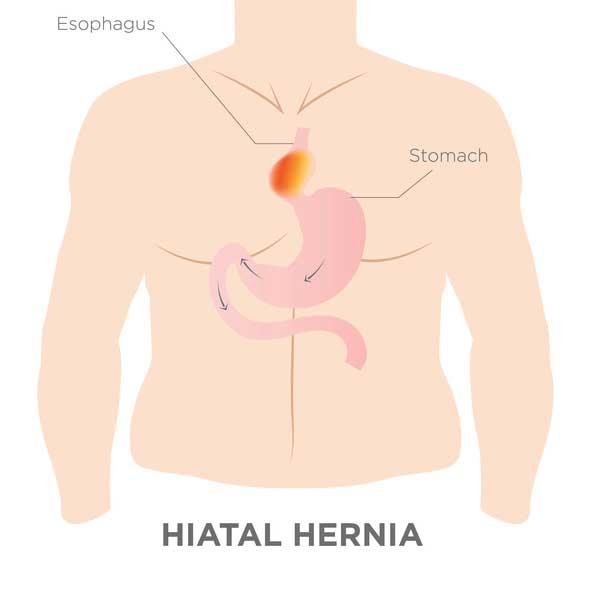Hiatal Hernia Treatment in Midland Park, NJ
What Is a Hiatal Hernia?

A hiatal hernia is a condition in which the top portion of the stomach pushes upward through your diaphragm—the muscular wall separating the chest cavity from the abdomen. According to the Esophageal Cancer Awareness Association, this condition will affect about 60 percent of people by the time they turn 60 years old.
Although a small stomach hernia may not cause any symptoms, larger ones can lead to heartburn or may be signs of more serious stomach disorders. To schedule an appointment with a healthcare practitioner in Midland Park who specializes in hiatal hernia treatment, call (201) 806-6099 or contact Medwell Orthopedics & Functional Medicine for Men & Women online.
Hiatal Hernia Causes
Hiatal hernias are most commonly caused by increased pressure in the abdominal cavity. Pressure can increase due to physical strain, such as coughing, vomiting, or heavy lifting. Factors that can also increase your risk of developing hiatal hernia include obesity, pregnancy, being over 50 years old, and smoking.
There are two main hiatal hernia types; sliding and paraesophageal. A sliding hernia is more common, and it is where the stomach and the section of the esophagus that joins the stomach slide up into the chest. A paraesophageal hernia, also known as a fixed hernia, is when the stomach and esophagus do not slide, and a part of the stomach can squeeze into the hiatus, landing next to the esophagus. A fixed hiatal hernia is more serious because there is a risk of the blood supply to the stomach being cut off.
Hiatal Hernia Symptoms
Many people who have hiatal hernias never show symptoms, but those that do tend to have:
There does seem to be a correlation between hiatal hernias and gastroesophageal reflex disease (GERD) , as these two diseases share many symptoms, such as heartburn and stomach or esophagus discomfort. However, there does not appear to be a causation between the two diseases, as not everyone with hiatal hernias has GERD, and vice versa.
More serious symptoms of hiatal hernia may be considered medical emergencies. These include vomiting blood, nausea, or an inability to pass gas or empty the bowels. This could be a sign of heart problems or peptic ulcers. If you are experiencing persistent or serious hiatal hernia symptoms, talk with a healthcare provider immediately.
Hiatal Hernia Diagnosis
There are several tests that a medical professional can perform to diagnose a hiatal hernia. The two most common are a barium X-ray and an endoscopy. Barium is a chalky-white liquid that is ingested and coats the walls of the esophagus and stomach to provide more visibility of the gastrointestinal (GI) tract. In an endoscopy, a thin, flexible tube with a light and video camera is passed down the esophagus and stomach to check to see if the stomach is pushing against your diaphragm.
Another common test includes an esophageal manometry, which uses catheters inserted through the nose to measure pressure, strength, muscle coordination and movement in the esophagus.
Treatment for Hiatal Hernia

There are various treatments for hiatal hernias, including lifestyle changes and surgeries.
Lifestyle Changes
For most people, hiatal hernia treatment will only involve at-home care which modifies their daily habits to alleviate their symptoms. These modifications include:
- Avoiding certain foods like spicy foods, chocolate, tomatoes, citrus fruits, and caffeine
- Eating several smaller meals per day instead of three big meals
- Eating at least two or three hours before bedtime
- Quitting smoking and limiting alcohol
- Elevating the head of your bed by at least 6 inches
- Eating in an upright position
- Losing excess weight (if overweight or obese)
- Not wearing tight belts or clothing
- Not straining during bowel movements
In addition to these treatments, there are also medications for GERD that may help patients with hiatal hernia alleviate their symptoms. These include antacids that neutralize stomach acid, H2 blockers to reduce acid production and proton pump inhibitors that block acid production to allow the esophagus to heal.
Hiatal Hernia Surgery
Surgery is not commonly recommended as a hiatal hernia treatment, and usually happens as a result of a medical emergency. In cases where surgery is deemed necessary, a nissen fundoplication is used to fix both a hiatal hernia and acid reflux. To perform this operation, the stomach is pulled back into the abdomen and the bottom of the esophagus is pulled around the top of the stomach to prevent the stomach contents from re-entering the esophagus.
A nissen can be performed with a laparotomy, which involves making a small incision through the abdomen and inserting a miniature camera and monitor through to see the hiatal hernia. Although an incision can be made in the chest wall, known as a thoracotomy, a laparotomy is preferred because it utilizes smaller incisions with less scarring and risk of infection, is less painful, and has a quicker recovery time.
A hernia in the stomach can cause more problems than just heartburn. If you or someone you know is suffering from a hiatal hernia in Midland Park, call (201) 806-6099 or contact Medwell Orthopedics & Functional Medicine for Men & Women online.
Medwell Orthopedics & Functional Medicine for Men & Women
Address
33 Central AveMidland Park, NJ 07432
(201) 806-6099
www.BergenCountyDoctors.com
Hours
Mon:
8:00 am - 8:00 pm
Tue:
2:00 pm - 7:00 pm
Wed:
8:00 am - 6:30 pm
Thu:
8:00 am - 1:00 pm
Fri:
8:00 am - 6:30 pm
Sat:
9:00 am - 1:00 pm
Sun:
By Appointment Only

